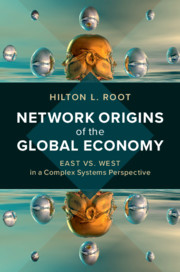Book contents
- Network Origins of the Global Economy
- Network Origins of the Global Economy
- Copyright page
- Dedication
- Contents
- Figures
- Tables
- Contributors
- Preface
- Overview
- Acknowledgments
- Part I Political Economy and Complex Systems
- Part II An Analysis of Historical Regimes
- Part III The Coming Instability
- 7 Has the Baton Passed to China?
- 8 China’s Ambitions and the Future of the Global Economy
- 9 Global Networks over Time
- 10 A Future of Diminishing Returns or Massive Transformation?
- 11 Network Structure and Economic Change: East vs. West
- References
- Index
10 - A Future of Diminishing Returns or Massive Transformation?
from Part III - The Coming Instability
Published online by Cambridge University Press: 17 March 2020
- Network Origins of the Global Economy
- Network Origins of the Global Economy
- Copyright page
- Dedication
- Contents
- Figures
- Tables
- Contributors
- Preface
- Overview
- Acknowledgments
- Part I Political Economy and Complex Systems
- Part II An Analysis of Historical Regimes
- Part III The Coming Instability
- 7 Has the Baton Passed to China?
- 8 China’s Ambitions and the Future of the Global Economy
- 9 Global Networks over Time
- 10 A Future of Diminishing Returns or Massive Transformation?
- 11 Network Structure and Economic Change: East vs. West
- References
- Index
Summary
The fast-growing economies of the combined lower- and middle-income countries have propelled them into new strategic and economic alliances, often bypassing the developed world. These changing patterns of global connectivity are rewiring the underlying grid. The West is no longer blindly imitated by others, even among its developing-nation allies. The very quality that sets the Western legal tradition apart – its judicial institutions whose legitimacy resides in binding those who govern to the same laws as other citizens – has rarely transferred effectively to regions where the cultural antecedents are absent. It is no longer possible to deny that China’s spectacular performance in raising its living standards has shown an alternative. Inevitably, this divergence will be projected onto struggles for shaping the policies of global institutions, their governance, and perceptions of their legitimacy. How China or the West handle other threats – forced migration, internal displacement, global radicalization – will have a great bearing on their relative global influence and ability to shape the trajectory of the world economy.
Keywords
- Type
- Chapter
- Information
- Network Origins of the Global EconomyEast vs. West in a Complex Systems Perspective, pp. 256 - 265Publisher: Cambridge University PressPrint publication year: 2020



